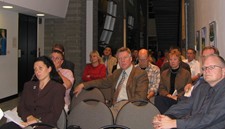Airing Concerns About Economic Diversification
By 250 News
Prince George, B.C. - So, the question is, as Prince George tries to diversify the economy in the shadow of the mountain pine beetle, does it do so at the cost of the environment, at the cost of air quality? That is the question the Alternatives and Opportunities, forum looked to answer.
It was the first of a four part series of discussions about the future for Prince George and how that future will be shaped by the major issues facing the community. The issues being: air quality, labour stability, technology and crime.
(at right, about 20 people turned out to the Two Rivers Art Gallery to hear the comments from three very different speakers)
Bruce Sutherland, the owner of a successful company which has diversified it's customer base; Councilor Don Zurowski who has been on the City Council throughout the beetle epidemic and air quality issues; and Dave Fuller, the President of PACHA, the People's Action Committee for Healthy Air.
There is concern any growth or diversification of the city would have an impact on the quality of the air as the airshed in Prince George has already been declared “fragile”.
Bruce Sutherland, the President of Wolftek Industries and Chair of the Northern Trust says with 40 employees, his company has diversified . It started out serving just the forestry industry, but has since grown to service other industries, including mining. Diversification, is the key says Sutherland when it comes to any aspect of economic planning. Sutherland says the mountain pine beetle crisis has created a situation for partnerships and research “See the problem, seek an answer, create a solution”.
Councilor Don Zurowski was the second panelist to speak and noted air quality is on the Provincial agenda, and on the Federal agenda. The real problem for Prince George says Zurowski, comes in the Pm2.5 levels. “Even if there was no industry we live at the confluence of two rivers, with cutbanks and dust, and it is difficult” says Zurowski. Still, he says the city is doing what it can to see that new industry is not located in the bowl area. “We must challenge permit issuers to monitor and enforce the regulations. We must be more vocal with the regulators” He also wants to make sure permits are checked regularly and “enforced with major fines and consequences.”
Zurowski says changes have been made but there needs to be more, because air quality is a major factor when people are making a choice about moving here. “We have to work with the existing permit holders.” Zurowski says “We are working with major industry who have invested lots of money and were permitted, and now we want to change the rules in the middle of the game. We have to offer some incentive.” He says there should be tax breaks for those who invest in change, and penalties for those who don't.
The President of PACHA, (the People’s Action Committee for Healthy Air) Dave Fuller says despite the fact the issue has been on the radar for the City for more than a decade, the air is getting worse. He says there are too many studies, not enough action. As for solutions: Fuller suggests that in Europe, effluent ponds at pulp mills have to be covered, those ponds are the source of much of the sulphur smell. He says the odour factor this week has been five times the “acceptable” limits. “If that were you or I the City or Regional District would act.”
He says there are other things like a ring road, to reduce heavy emissions from traffic, regular reviews of permits and stiffer penalties for polluters “Through collaboration we can make Prince George a better place for all of us.”
Previous Story - Next Story
Return to Home









I see. Deos not seem that is done in practice.
If the City were really practicing by those words, the City would cooperate better with the MoE with a City requirement that when a new plant is applying for a building permit they ensure an assessment is first done on the impact of that plant, including its impact on the air. Once that is done and is acceptable, then both permits can be issued.